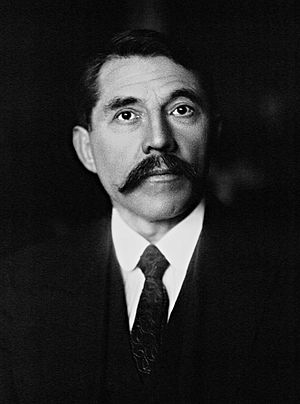Marcel Cachin facts for kids
Quick facts for kids
Marcel Cachin
|
|
|---|---|

In 1918
|
|
| French MP | |
| In office 1914–1936 |
|
| Constituency | Seine |
| French MP | |
| In office 1945–1958 |
|
| Constituency | Seine |
| Senator | |
| In office 1936–1940 |
|
| Constituency | Seine |
| Personal details | |
| Born | 20 September 1869 Plourivo, Côtes d'Armor |
| Died | 12 February 1958 (aged 88) Choisy-le-Roi, France |
| Political party | PCF |
| Other political affiliations |
SFIO (1914–1921) |
Marcel Cachin (born September 20, 1869 – died February 12, 1958) was an important French politician. He was a member of the French Communist Party and worked as the editor of a daily newspaper called L'Humanité. He lived a long life and saw many big changes in France and the world.
Contents
Early Political Life
Marcel Cachin started his political journey in 1891. He joined a group called the French Workers' Party. Later, in 1905, he became part of a new party, the French Section of the Workers' International (SFIO).
In 1914, he was elected to the Chamber of Deputies, which is like a part of the French parliament. This meant he helped make laws for France.
World War I and Russia
During World War I, Marcel Cachin supported his country. In 1917, he went to Russia on a special mission. At that time, he supported the Russian Provisional Government, which wanted Russia to keep fighting in the war. He did not agree with Lenin and the Bolsheviks, who wanted Russia to leave the war.
In 1918, after the war ended, he spoke at a big event in Strasbourg. This event celebrated the city returning to French control.
Founding the Communist Party
After World War I, many people in France started to feel more sympathetic towards the October Revolution in Russia. In 1920, Marcel Cachin was one of the people who helped create the French Communist Party. This party was also known as SFIC. He also joined the Third International, a group of communist parties from around the world.
In 1923, he was put in jail. This happened because he spoke out against France occupying parts of Germany (the Ruhr) and Morocco. He was a strong supporter of the pro-Soviet Communist Party.
Later Years and Recognition
Marcel Cachin was the editor of the newspaper L'Humanité for a very long time, from 1918 until he died in 1958.
In 1940, he was removed from his political job. This was because he supported a non-aggression agreement between Germany and the Soviet Union, known as the Molotov–Ribbentrop Pact. After France was freed from occupation, he returned to the National Assembly in 1945. He continued to serve there until his death in 1958.
When he was 88 years old, Marcel Cachin received the Order of Lenin. This was a very important award from the Soviet Union. He was the first person from another country to get it. Later in his life, people often called him the "Grandfather of the Communist Party."
His granddaughter, Françoise Cachin, became a famous art historian.
Presidential Elections
Marcel Cachin ran for President of France several times. He was the candidate for the French Communist Party in four elections. These elections took place under the Third Republic and the Fourth Republic. He did not win any of these elections.
See also
 In Spanish: Marcel Cachin para niños
In Spanish: Marcel Cachin para niños

